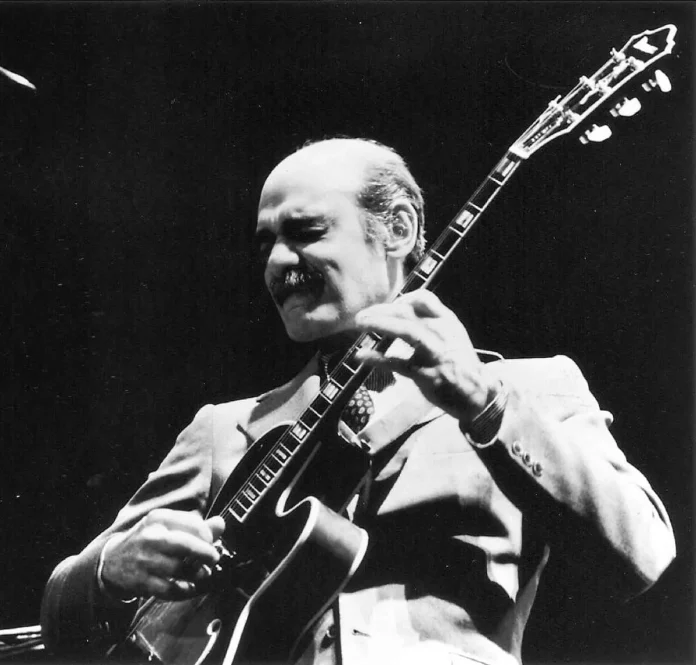Joe Pass has been called the ‘Art Tatum of the guitar’, and his intimate technical knowledge of the fretboard makes the comparison appropriate. But a full house at the Shaw Theatre in London one Saturday afternoon in July also learnt that Joe has not forgotten the importance of simply playing by ear.
The occasion was a guitar clinic organised by Maurice Summerfield in conjunction with The Jazz Centre Society and the Borough Of Camden. Summerfield imports the increasingly popular Ibanez guitars in to the UK. (Pass’s new guitar, the JP20, was jointly designed by Pass and Ibanez).
This was strictly a question and answer affair: no guitars were played except Joe’s, which he used for recital and demonstration. He proved genial and articulate, investigating points under discussion with the same thoroughness he applies to improvisation. No patented ‘Joe Pass Guitar Method’ was offered and it became clear that Joe’s playing is the sum of many diverse parts, an evolution over many years.
Practice is one of these parts, and Joe recommended a way of scale practice which is fundamental to his approach to improvising. He suggests taking a chord and running an appropriate scale from the tonic up to the top note of the chord, thus ensuring that the solo line reflects the pitching and flavour of the chord. This ties in with his solo philosophy, in that he avoids applying a blanket modal approach to chord changes in the same key. The blueprint for a Pass solo is provided by the chords and melody, a method that he feels makes the changes clearer. He finds that modal soloing (choosing a scale common to a number of chords in a sequence) tends to homogeneity and does nothing to enhance the character of the tune.
Master technician though he is, Pass tries to avoid playing anything he cannot hum simultaneously, and as an illustration, he scatted along with his own improvised bop guitar line. He spoke also of a pitiless test he applies to sort out the aleatory from the consciously crafted: he asks a player to replay an improvised phrase.
Some time was spent explaining picking and fingering technique: Though not classically trained, Joe employs finger-picking much of the time, using the thumb for the bass strings and the fingers for the top three, and says that this allows better tonal variety and control than the plectrum. Although he says ‘the pick removes you a bit from the instrument’, he does use it for fast or staccato playing or to get a percussive effect. Since there is more strength in downpicking, Pass employs this when moving across the strings, but picks alternately when playing up and down a single string.
The afternoon of decomposition ended with Pass in the confessional, offering an integrated reading of Green Dolphin Street and the salutary advice ‘Play intuitively, by ear – don’t start analysing too much’.
















